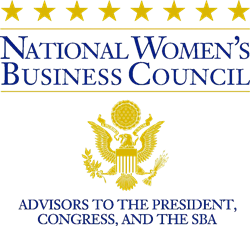
“As the report and policy recommendations demonstrate, while we have made significant legislative and economic strides in advancing a new generation of women entrepreneurs, much work still lies ahead,” said Sara. “We will continue our efforts with a focus on our three areas of primary importance.”
WASHINGTON (PRWEB)
December 20, 2019
The National Women’s Business Council (NWBC) has submitted its 2019 Annual Report to the President, the Senate Committee on Small Business and Entrepreneurship, the House Committee on Small Business, and the Administrator of the Small Business Administration.
This report recaps NWBC’s 31st year and provides the findings, conclusions, and policy recommendations of the Council. NWBC Chair Liz Sara, now in her second year at the helm, has concentrated its mission to strengthen women in business on three major areas: improving access to capital for female founders, encouraging more women to start and grow companies in STEM-related fields, and removing obstacles for women business owners in rural areas.
The NWBC also launched a Women in Small Business Roundtable series across the country, which convened over 300 women business owners and stakeholders from New York, NY to Nampa, ID; from St. Petersburg, FL to Los Angeles, CA. The goal was to gain a deeper insight into the challenges and overall landscape in which women founders and small business owners currently operate.
“As the report findings and policy recommendations demonstrate, while we have made significant legislative and economic strides in advancing a new generation of women entrepreneurs, much work still lies ahead,” said Sara. “That is why the work of the Council continues to be vital. In 2020, we will continue our efforts with a laser focus on our three overarching issues areas of primary importance.”
The following are some of the policy recommendations found in the report:
For improving access to capital:
One policy recommendation is to Incentivize New Investments via a Federal Angel Investment Tax Credit: The Council recommends that Congress amend the Internal Revenue Code to allow for a Federal Angel Investment Tax Credit. This would constitute a credit of up to 50% of a qualified debt or equity investment which can be claimed over the first three (3) years of an investment—up to twenty-five percent (25%) in the first tax year, fifteen percent (15%) in the second tax year, and ten percent (10%) in the third tax year—with a lifetime limit of $50,000 and applicable to each firm in which an “angel” invests.
Provide a First Employee Tax Credit to Assist Small Businesses Hiring Their First Employee: The Council also supports a First Employee Tax Credit to assist small businesses, particularly those operating in service industries, to hire their first employee. The credit should equal 25% of the W-2 wages reported, which can be claimed annually, up to $10,000 in a single tax year, with a lifetime limit of $40,000. Given that many businesses do not turn a profit in the first few years of operation, the first employee tax credit should be creditable against the business’ payroll tax liability. However, there should be no earnings cap for this credit. The credit should be designed to also help individuals living in urban areas where the cost of living is higher, as well as new market entrants in the STEM fields.
For encouraging more women in STEM-related fields:
Further engage HBCU’s Conducting R&D in SBIR Programming and Expand Outreach with Key Agencies: In light of SBA’s plans, NWBC urges the agency to work toward increasing program participation among those conducting technological innovation research at HBCUs and Minority Serving Institutions (MSIs). More specifically, the Council urges the agency to include the eleven (11) HBCUs, identified by the agency’s Office of Entrepreneurial Development (OED) as conducting R&D, in the SBA SBIR Road Tour, as well as develop and/or expand its outreach and coordination efforts with other federal agencies such as the National Aeronautics and Space Administration (NASA) and the National Science Foundation (NSF), to name just a few.
For removing obstacles for women in rural areas:
NWBC Supports the Development of a Playbook of Rural Case Studies: The SBA and USDA should develop an online playbook of case studies on rural entrepreneurship. Universities, local chambers of commerce, non-profits, corporations, and other relevant stakeholders are uniquely positioned to contribute informative case studies and valuable success stories, which may be showcased. Additionally, empirical data and best practices could be used to inform the creation of innovative trainings and resource programs for these particularly underserved areas. Due to the vast separation from urban hubs and the inadequate access to federal resources that strengthen them, rural communities are compelled to identify the most cost-efficient, creative solutions to economic hardships.
To access the 2019 NWBC Annual Report, click here: https://www.nwbc.gov/category/annual-reports/
About the National Women’s Business Council
The National Women’s Business Council (NWBC) is a non-partisan federal advisory committee created to serve as an independent source of advice and policy recommendations to the President, Congress, and the U.S. Small Business Administration on economic issues of importance to women business owners. To learn more, please visit: http://www.NWBC.gov
Share article on social media or email:

